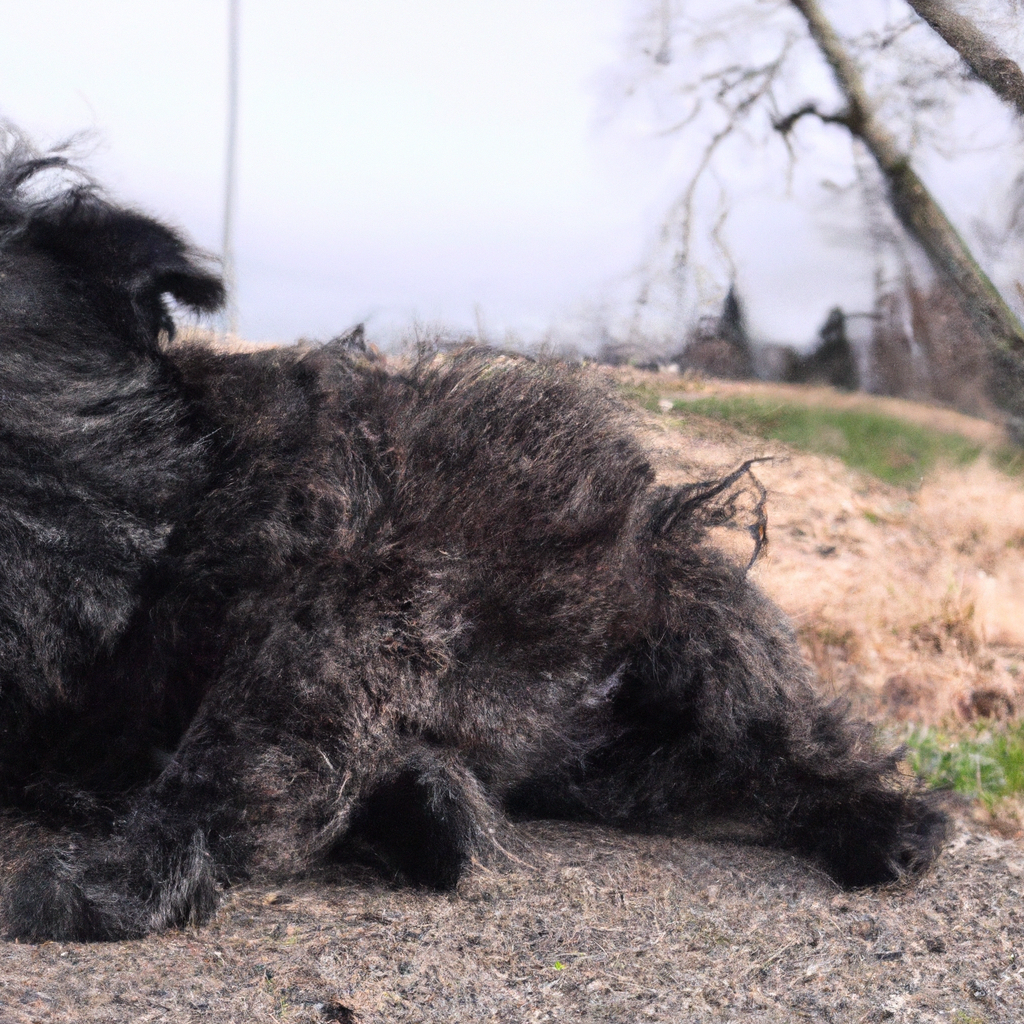Affenpinscher, a toy dog breed known for its monkey-like face, is generally healthy but can be prone to certain health problems that may shorten its lifespan. These health issues include heart disorders, respiratory problems, and orthopedic issues such as hip dysplasia and luxating patella. Affenpinschers may also suffer from eye problems like cataracts and glaucoma, as well as skin conditions. Additionally, they are prone to certain genetic disorders including von Willebrand’s disease, a blood clotting disorder. These health problems, if not properly managed or treated, can significantly reduce the lifespan of an Affenpinscher.
Common Genetic Disorders in Affenpinschers
Affenpinschers, affectionately known as “Monkey Dogs,” are a small breed of dog known for their playful and adventurous nature. Despite their small size, these dogs are full of energy and have a lifespan of approximately 12 to 14 years. However, like any other breed, Affenpinschers are prone to certain health problems that can potentially shorten their lifespan. Understanding these common genetic disorders can help owners provide the best care for their Affenpinscher and potentially extend their life.
One of the most common genetic disorders in Affenpinschers is hip dysplasia. This condition occurs when the hip joint doesn’t develop properly, leading to a gradual deterioration and potential loss of function of the hip joint. Hip dysplasia can cause discomfort and pain, and in severe cases, it can limit the dog’s ability to walk. Regular vet check-ups can help detect this condition early, and treatments can range from medication to manage pain to surgery in severe cases.
Another common health problem in Affenpinschers is a condition known as patellar luxation. This is a knee condition where the dog’s kneecap dislocates or moves out of its normal position. It can cause lameness in the leg or an abnormal gait, sort of a skip or a hop. It’s a common condition in small dogs and can be present at birth or develop later in life. Treatment for patellar luxation varies depending on the severity of the condition, but it can include physical therapy, weight management, and in some cases, surgery.
Affenpinschers are also prone to a heart condition known as mitral valve disease. This condition affects the heart’s ability to pump blood effectively, leading to symptoms such as coughing, fatigue, and difficulty breathing. While this condition is more common in older dogs, it can occur at any age. Regular vet check-ups can help detect this condition early, and treatment typically involves medication to help manage the symptoms.
Eye problems are also common in Affenpinschers, particularly cataracts and progressive retinal atrophy (PRA). Cataracts can cause cloudiness in the eye lens, leading to decreased vision, while PRA is a degenerative eye disorder that eventually leads to blindness. Regular eye exams can help detect these conditions early, and while cataracts can often be surgically removed, there is currently no effective treatment for PRA.
Lastly, Affenpinschers can be prone to a skin condition known as atopic dermatitis. This is an inflammatory, chronic skin disease associated with allergies. These allergies can be to anything in the dog’s environment, such as dust mites or pollen. Symptoms include itching, redness, and chronic ear infections. Treatment typically involves managing the symptoms and avoiding the allergens as much as possible.
While it may seem like a daunting list of potential health problems, it’s important to remember that not all Affenpinschers will suffer from these conditions. Regular vet check-ups and a healthy lifestyle can go a long way in preventing these issues and ensuring your Affenpinscher lives a long, happy life. After all, knowledge is power, and being aware of these common genetic disorders can help you provide the best possible care for your furry friend.
The Impact of Dental Diseases on Affenpinscher’s Lifespan
Affenpinschers, affectionately known as “Monkey Dogs,” are small, charming, and energetic dogs that are loved for their unique appearance and playful nature. However, like all breeds, they are susceptible to certain health problems that can potentially shorten their lifespan. One of the most common, yet often overlooked, health issues that can impact an Affenpinscher’s lifespan is dental disease.
Dental disease in Affenpinschers, as in other breeds, is not just a matter of bad breath or unsightly teeth. It’s a serious health concern that can lead to life-threatening complications if left untreated. The problem begins when food particles and bacteria accumulate in the dog’s mouth, forming plaque. If not removed, this plaque hardens into tartar, leading to gingivitis, an inflammation of the gums. This is the first stage of periodontal disease, which is the most common dental condition in dogs.
As the disease progresses, it can cause a host of problems. The gums may start to recede, exposing the roots of the teeth and making them vulnerable to decay. In severe cases, the dog may lose teeth. But the trouble doesn’t stop there. The bacteria from the mouth can enter the bloodstream and spread to other parts of the body, including the heart, liver, and kidneys. This can lead to serious systemic diseases that can significantly shorten an Affenpinscher’s lifespan.
The impact of dental disease on an Affenpinscher’s lifespan can be profound. Studies have shown that dogs with dental disease often live shorter lives than those with healthy mouths. This is because the systemic diseases caused by dental disease can be severe and difficult to treat. For example, the bacteria that cause dental disease can lead to endocarditis, an infection of the heart’s inner lining. This condition can be fatal if not treated promptly.
Moreover, dental disease can also affect an Affenpinscher’s quality of life. Dogs with dental disease often experience pain and discomfort, which can make eating difficult and lead to weight loss. They may also become less active and playful, which can affect their overall well-being.
The good news is that dental disease is largely preventable. Regular dental care, including brushing your Affenpinscher’s teeth and providing dental chews, can help keep your dog’s mouth healthy. Regular veterinary check-ups are also crucial, as your vet can spot early signs of dental disease and provide appropriate treatment.
In conclusion, dental disease is a serious health problem that can significantly shorten an Affenpinscher’s lifespan. However, with proper care and attention to dental hygiene, you can help ensure that your Affenpinscher lives a long, healthy, and happy life. Remember, a healthy mouth is an essential part of a healthy dog. So, don’t overlook your Affenpinscher’s dental health. It’s not just about a pretty smile; it’s about adding years to your beloved pet’s life.
Understanding Heart Diseases in Affenpinschers
Affenpinschers, affectionately known as “Monkey Dogs,” are small, sturdy dogs known for their playful and adventurous nature. Despite their robust appearance, these little canines are not immune to health issues, some of which can significantly shorten their lifespan. One of the most common health problems that afflict Affenpinschers is heart disease.
Heart disease in Affenpinschers is a broad term that encompasses several conditions that affect the heart’s structure and function. These conditions can be congenital, meaning they are present at birth, or they can develop over time due to factors such as age, diet, and lifestyle.
One of the most common types of heart disease in Affenpinschers is mitral valve disease. This condition occurs when the mitral valve, which separates the heart’s left atrium and ventricle, deteriorates. This deterioration prevents the valve from closing properly, leading to a backflow of blood into the atrium. Over time, this can cause the heart to enlarge and eventually lead to heart failure.
Another common heart condition in Affenpinschers is dilated cardiomyopathy. This disease causes the heart’s chambers to enlarge and the walls to thin, reducing the heart’s ability to pump blood effectively. This condition can lead to symptoms such as fatigue, loss of appetite, and difficulty breathing. If left untreated, dilated cardiomyopathy can result in heart failure.
While these conditions sound alarming, it’s important to remember that not all Affenpinschers will develop heart disease. Many factors contribute to an individual dog’s risk, including genetics, age, diet, and exercise habits. For example, older Affenpinschers and those with a family history of heart disease are at a higher risk.
However, there are steps you can take to help keep your Affenpinscher’s heart healthy. Regular veterinary check-ups are crucial for early detection and treatment of heart disease. Your vet can perform tests such as echocardiograms and electrocardiograms to assess your dog’s heart health.
In addition to regular vet visits, a balanced diet and regular exercise can also help prevent heart disease. Feeding your Affenpinscher a diet rich in lean proteins, fruits, vegetables, and whole grains can help maintain a healthy weight and reduce the risk of heart disease. Regular exercise, such as daily walks or play sessions, can also help keep your dog’s heart strong and healthy.
If your Affenpinscher is diagnosed with heart disease, don’t despair. Many treatments are available that can help manage the condition and improve your dog’s quality of life. Medications can help control symptoms and slow the progression of the disease. In some cases, surgical procedures may be necessary.
In conclusion, while heart disease is a common health problem in Affenpinschers, it’s not a guaranteed fate. With regular vet check-ups, a healthy diet, and regular exercise, you can help keep your Affenpinscher’s heart healthy and extend their lifespan. And even if your dog is diagnosed with heart disease, remember that treatments are available that can help your furry friend live a happy and fulfilling life.
Hip Dysplasia and its Effects on Affenpinschers

Affenpinschers, affectionately known as “Monkey Dogs,” are a small breed of dog that originated in Germany. These adorable, energetic, and loyal companions are known for their long lifespans, often living up to 12-15 years. However, like all breeds, Affenpinschers are prone to certain health problems that can potentially shorten their lifespan. One of the most common health issues that affect this breed is hip dysplasia.
Hip dysplasia is a genetic condition that affects the hip joint of dogs. It occurs when the ball and socket of the hip joint do not fit together properly, causing the joint to become loose and unstable. Over time, this instability can lead to painful arthritis and, in severe cases, lameness. This condition is particularly prevalent in Affenpinschers due to their small size and the fact that they are a purebred breed, which increases their risk of inheriting genetic disorders.
The effects of hip dysplasia on Affenpinschers can be quite significant. The condition can cause a great deal of pain and discomfort, which can affect the dog’s quality of life. Affenpinschers with hip dysplasia may have difficulty walking, running, or even standing up. They may also become less active and playful, which can lead to weight gain and other health problems.
Moreover, hip dysplasia can also affect an Affenpinscher’s lifespan. The condition can lead to severe arthritis, which can cause a significant amount of pain and discomfort. In severe cases, the dog may require surgery to correct the problem, which can be risky and expensive. Furthermore, the stress and pain associated with hip dysplasia can also lead to other health problems, such as heart disease and kidney problems, which can further shorten the dog’s lifespan.
However, it’s not all doom and gloom for Affenpinschers with hip dysplasia. There are several treatment options available that can help manage the condition and improve the dog’s quality of life. These include pain management, physical therapy, and in some cases, surgery. A healthy diet and regular exercise can also help to maintain a healthy weight and keep the joints as healthy as possible.
Early detection is key when it comes to managing hip dysplasia in Affenpinschers. Regular vet check-ups can help to identify the condition early on, which can make treatment more effective. If you notice any changes in your Affenpinscher’s behavior, such as a decrease in activity or difficulty moving, it’s important to consult with a vet as soon as possible.
In conclusion, while hip dysplasia is a common health problem that can potentially shorten an Affenpinscher’s lifespan, it’s not a death sentence. With early detection and proper management, Affenpinschers with hip dysplasia can still lead happy, healthy lives. As a responsible pet owner, it’s important to be aware of the potential health problems that can affect your pet and to take steps to prevent and manage these issues. After all, our furry friends rely on us to keep them healthy and happy.
Patellar Luxation: A Common Affenpinscher Health Issue
Affenpinschers, affectionately known as “Monkey Dogs,” are small, charming, and energetic dogs that are loved for their unique appearance and playful nature. However, like any breed, they are prone to certain health issues that can potentially shorten their lifespan. One of the most common health problems that Affenpinschers face is Patellar Luxation.
Patellar Luxation, also known as slipped stifles, is a condition where the dog’s kneecap (patella) dislocates or moves out of its normal location. This condition is quite common in small dog breeds, including Affenpinschers. It’s a congenital disease, meaning it’s present at birth, although the actual misalignment often doesn’t occur until much later.
The signs of Patellar Luxation in Affenpinschers can vary. Some dogs will exhibit obvious limping or abnormal hind-leg movement, while others may not show any outward signs at all. However, over time, the condition can cause discomfort and pain, and in severe cases, it can lead to lameness.
So, how does Patellar Luxation occur? Well, it’s all about the anatomy of the dog’s knee. The patella sits in a groove in the femur (the large bone of the upper leg), and it’s held in place by ligaments. When these ligaments are weak or malformed, the patella can slip out of the groove, causing the leg to lock up with the foot held off the ground.
Now, you might be wondering, how can this condition be treated? The treatment for Patellar Luxation depends on the severity of the condition. In mild cases, your vet may recommend physical therapy or weight management to reduce strain on the knee joint. In more severe cases, surgery may be necessary to realign the kneecap and prevent further damage to the joint.
Prevention is always better than cure, and this is particularly true for Patellar Luxation. Regular check-ups with your vet can help detect the condition early, and appropriate exercise can help strengthen your Affenpinscher’s leg muscles, reducing the risk of Patellar Luxation.
It’s also important to note that Patellar Luxation can be a hereditary condition. If you’re considering getting an Affenpinscher, it’s a good idea to ask the breeder about the parents’ health history. Reputable breeders will be able to provide health clearances for both parents, which can give you peace of mind about your future pet’s health.
In conclusion, while Patellar Luxation is a common health issue in Affenpinschers, it doesn’t have to be a life sentence. With early detection, appropriate treatment, and preventative measures, your Affenpinscher can live a long, happy, and healthy life. Remember, your vet is your best resource for any health concerns you may have about your pet. Regular check-ups and open communication with your vet can go a long way in ensuring your Affenpinscher’s well-being.
The Threat of Obesity in Affenpinschers
Affenpinschers, affectionately known as “Monkey Dogs,” are a small but sturdy breed known for their playful and adventurous nature. However, like all breeds, they are susceptible to certain health problems that can potentially shorten their lifespan. One of the most common and significant threats to an Affenpinscher’s health is obesity.
Obesity in Affenpinschers, as in humans, is a condition where the dog carries excess body fat that can negatively impact their health. It’s a serious issue that can lead to a variety of health problems, including heart disease, diabetes, and joint problems. The extra weight puts unnecessary strain on the dog’s body, making it harder for them to move around and enjoy their usual activities. This can lead to a decrease in their quality of life and, in severe cases, can even shorten their lifespan.
The main cause of obesity in Affenpinschers, and indeed in most dogs, is overfeeding coupled with a lack of exercise. These dogs are small and don’t require a large amount of food to maintain a healthy weight. However, many owners, charmed by their Affenpinscher’s expressive eyes and playful demeanor, find it hard to resist giving them extra treats. This, combined with a sedentary lifestyle, can quickly lead to weight gain.
Another contributing factor to obesity in Affenpinschers is their genetic predisposition. Some dogs are simply more prone to gaining weight than others, and Affenpinschers fall into this category. This doesn’t mean that every Affenpinscher will become obese, but it does mean that owners need to be extra vigilant about their dog’s diet and exercise routine.
Preventing obesity in Affenpinschers is a matter of balance. They need a diet that provides them with the nutrients they need without providing excess calories. This usually means a high-quality dog food that’s appropriate for their size and age. Treats should be given sparingly and should never make up more than 10% of the dog’s daily caloric intake.
Exercise is also crucial in preventing obesity. Affenpinschers are active and playful dogs that love to run and play. Regular walks, play sessions, and even agility training can help keep them fit and healthy. It’s also a great way to bond with your dog and keep them mentally stimulated.
If you suspect that your Affenpinscher is overweight, it’s important to consult with a vet. They can provide you with a proper diet and exercise plan tailored to your dog’s specific needs. They can also monitor your dog’s weight and overall health to ensure that they’re on the right track.
In conclusion, obesity is a serious threat to an Affenpinscher’s health and lifespan. However, with the right diet, regular exercise, and regular vet check-ups, it’s a threat that can be effectively managed. As an owner, it’s your responsibility to ensure that your Affenpinscher maintains a healthy weight so they can live a long, happy, and active life. Remember, a healthy Affenpinscher is a happy Affenpinscher.
Respiratory Problems in Affenpinschers
Affenpinschers, affectionately known as “Monkey Dogs,” are small, charming, and energetic dogs that are loved for their unique appearance and playful nature. However, like any breed, they are prone to certain health issues that can potentially shorten their lifespan. One of the most common health problems that Affenpinschers face is respiratory issues.
Respiratory problems in Affenpinschers can manifest in various ways, and it’s crucial for owners to be aware of the signs and symptoms. One of the most common respiratory issues in this breed is Brachycephalic Syndrome. This condition is prevalent in breeds with short noses and flat faces, a category that Affenpinschers fall into. The syndrome is characterized by narrow nostrils, an elongated soft palate, and in some cases, a small windpipe. These abnormalities can lead to difficulty breathing, snoring, and in severe cases, collapse or fainting.
Another respiratory issue that can affect Affenpinschers is Tracheal Collapse. This condition occurs when the trachea, which carries air to the lungs, weakens and collapses, making it difficult for the dog to breathe. Symptoms include a honking cough, difficulty breathing, and intolerance to exercise. Tracheal Collapse can be a serious condition, and if left untreated, it can lead to life-threatening complications.
Affenpinschers are also prone to developing allergies, which can lead to respiratory problems. Allergies in dogs can be caused by a variety of factors, including food, environmental allergens like pollen and dust mites, and even certain materials like plastic. Allergic reactions can cause inflammation in the airways, leading to symptoms such as coughing, wheezing, and difficulty breathing.
While these respiratory issues can be concerning, it’s important to remember that with proper care and attention, many of these conditions can be managed effectively. Regular vet check-ups are crucial in catching any potential issues early. If your Affenpinscher is showing signs of respiratory distress, such as excessive panting, coughing, or difficulty breathing, it’s important to seek veterinary attention immediately.
Treatment for respiratory problems in Affenpinschers can vary depending on the severity and the specific condition. For instance, Brachycephalic Syndrome may require surgical intervention to widen the nostrils or shorten the soft palate. On the other hand, Tracheal Collapse can often be managed with medication to reduce inflammation and coughing, although in severe cases, surgery may be necessary.
When it comes to allergies, identifying and eliminating the allergen is the first step in treatment. This may involve a change in diet, or making changes to the dog’s environment. In some cases, medication may be prescribed to help manage symptoms.
In conclusion, while Affenpinschers are prone to certain respiratory problems, these issues don’t have to significantly shorten their lifespan. With proper care, regular vet check-ups, and prompt treatment when necessary, Affenpinschers can lead happy, healthy lives. As an owner, being aware of these potential health issues and knowing the signs to look out for can go a long way in ensuring your furry friend stays in the best possible health. After all, our pets rely on us to look out for their well-being, and there’s nothing more rewarding than seeing them thrive.
Eye Conditions that Affect Affenpinschers
Affenpinschers, affectionately known as “Monkey Dogs,” are small, charming, and energetic dogs that are loved for their unique appearance and playful nature. However, like all breeds, Affenpinschers are prone to certain health conditions that can potentially shorten their lifespan. One of the most common health issues that affect this breed is eye conditions.
Affenpinschers have large, round eyes that are one of their most distinctive features. However, these beautiful eyes are also susceptible to a variety of health problems. One of the most common eye conditions that affect Affenpinschers is Progressive Retinal Atrophy (PRA). This is a group of genetic diseases that cause the retina to deteriorate over time, leading to vision loss and eventually blindness. PRA is particularly concerning because it is progressive and irreversible.
Another eye condition that Affenpinschers may develop is cataracts. This condition is characterized by a cloudiness in the lens of the eye, which can impair vision. While cataracts are often associated with aging, they can also be caused by injury or disease. In some cases, cataracts can be removed surgically to restore vision. However, surgery is not always an option, especially for older dogs or those with other health issues.
Glaucoma is another eye condition that can affect Affenpinschers. This condition occurs when there is an increase in pressure within the eye, which can damage the optic nerve and lead to vision loss. Glaucoma can be particularly painful for dogs and if left untreated, it can lead to blindness.
Corneal ulcers are also common in Affenpinschers. These are sores or erosions that occur on the cornea, the clear front surface of the eye. Corneal ulcers can be caused by trauma, dry eye, or an infection. They can be extremely painful and can cause vision loss if not treated promptly.
While these eye conditions can be serious and potentially life-threatening, there are steps that Affenpinscher owners can take to protect their pet’s eye health. Regular veterinary check-ups are crucial for early detection and treatment of these conditions. Additionally, owners should be vigilant about their pet’s eye health and seek veterinary care if they notice any changes in their dog’s eyes, such as redness, cloudiness, or changes in vision.
Moreover, a healthy diet and lifestyle can also contribute to good eye health. Providing your Affenpinscher with a balanced diet rich in antioxidants can help to protect their eyes from damage. Regular exercise can also help to maintain overall health and wellbeing, which can in turn support eye health.
In conclusion, while Affenpinschers are prone to a number of eye conditions that can potentially shorten their lifespan, with proper care and attention, these issues can be managed effectively. Regular veterinary care, a healthy diet and lifestyle, and prompt attention to any changes in your pet’s eyes can go a long way in protecting your Affenpinscher’s eye health and overall wellbeing. After all, our furry friends rely on us to look after them, and ensuring their eye health is just one of the many ways we can do so.Affenpinscher’s lifespan can be shortened due to various health problems such as heart issues, respiratory disorders, dental problems, and hip dysplasia. These dogs are also prone to certain genetic disorders like patellar luxation and Legg-Calve-Perthes disease. Obesity can also lead to various health complications, reducing their lifespan. Regular vet check-ups and a balanced diet can help in early detection and management of these health issues.





